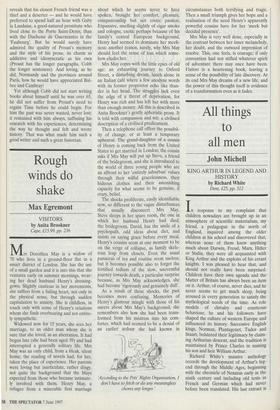Rough winds do shake
Max Egremont
VISITORS by Anita Brookner Cape, £15.99, pp. 236 Mrs Dorothea May is a widow of 70 who lives in a ground-floor flat in a smart district of London. She has the use of a small garden and it is into this that she ventures early on summer mornings, wear- ing her dead husband Henry's dressing- gown. Slightly cautious in her movements, she suffers from a failing heart, not only in the physical sense, but through sudden capitulation to anxiety. She is childless, in touch only with some of Henry's relations whom she finds overbearing and not entire- ly sympathetic.
Widowed now for 15 years, she sees her marriage, to an older man whom she is sure that she loved, as an aberration. It had begun late (she had been aged 39) and had interrupted a generally solitary life. Mrs May was an only child, from a bleak, silent home; the reading of novels had, for her, taken the place of experience. Her parents were loving but inarticulate, rather dingy, not quite the background that the Mays expected from those who became intimate- ly involved with them. Henry May, a refugee from a miserable first marriage about which he seems never to have spoken, brought her comfort, pleasure, companionship but not erotic passion. Expansive, smelling slightly of cigar smoke and cologne, exotic perhaps because of his family's central European background, Henry had seemed to dominate her meek- ness: another reason, surely, why Mrs May should feel the sense of loss which some- how eludes her.
Mrs May copes with the little epics of old age: an exhausting journey to Oxford Street, a disturbing dream, lunch alone in an Italian café where a few anodyne words with its former proprietor echo like thun- der in her head. The struggles lack even the edge of a threat of deprivation, for Henry was rich and has left her with more than enough money. All this is described in Anita Brookner's gently aphoristic prose. It is told with compassion and wit: a civilised description of a civilised predicament.
Then a telephone call offers the possibil- ity of change, or at least a temporary upheaval. The grand-daughter of a cousin of Henry is coming back from the United States to get married in London; the cousin asks if Mrs May will put up Steve, a friend of the bridegroom, and she is introduced to the world of three young people who are an affront to her 'entirely suburban' values through their wilful gracelessness, their hideous clothes and their astonishing capacity for what seems to be genuine, if crazy, belief.
The shocks proliferate, easily identifiable now, so different to the vague disturbances that usually disconcert Mrs May. Steve sleeps in her spare room, the one in which her husband Henry had died; the bridegroom, David, has the smile of a psychopath, odd ideas about diet, and insists on saying grace before every meal. Henry's cousins seem at one moment to be on the verge of collapse, as family skele- tons leap from closets. Even the usual panaceas of tea and routine seem useless; but it becomes possible also to forget the fortified tedium of the slow, uneventful journey towards death, a particular surprise because, as Mrs May acknowledges, she had become 'rigorously and genuinely dull'.
As a result of these shocks, the past becomes more confusing. Memories of Henry's glamour mingle with those of his sneers about Mrs May's background; she remembers also how she had been trans- formed from his mistress into his com- forter, which had seemed to be a denial of an earlier ardour she had known in 'According to the Pets' Rights Organisation, I don't have to fetch or do any meaningless chores any longer.' circumstances both terrifying and tragic. Then a small triumph gives her hope and a realisation of the need Henry's apparently powerful cousins have for her 'meek but decided presence'.
Mrs May is very well done, especially in the contrast between her inner melancholy, her doubt, and the outward impression of resolve. This, one feels, is courage; if only convention had not stifled whatever spirit of adventure there may once have been. Visitors is a heartening book, leaving a sense of the possibility of late discovery. At its end Mrs May dreams of a new life, and the power of this thought itself is evidence of a transformation even as it fades.










































































 Previous page
Previous page